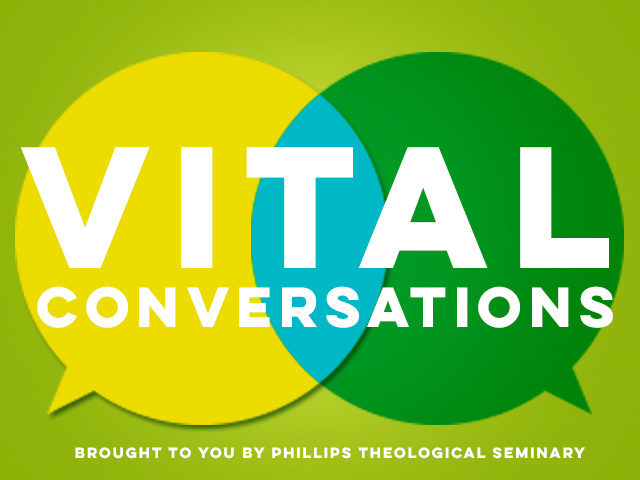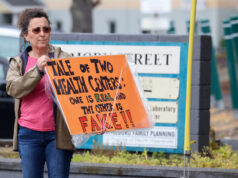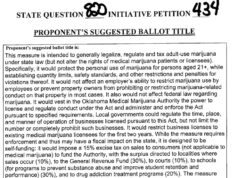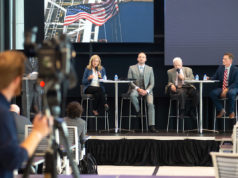
(Editor’s Note: Vital Conversations is a running series of commentaries from various faith leaders. The series is sponsored by Phillips Theological Seminary, though many contributions — like this one — come from theologians who are unassociated with the seminary.)
BOSTON — Being a born and raised Okie, I was often met with shock and awe when I told people in 2014 that my wife and I were moving to Boston for seminary and graduate school. The most popular platitude: “You know it’s cold up there, right?”
While, yes, it does get quite cold up here — and the 110 inches of snow is no joke — the starkest difference lies in church culture.
It seems that many Christian Oklahomans are proud to be from the Bible Belt. Although there is a growing disdain for the way the term pigeonholes Christians, there is still the affinity that we in Oklahoma are one of the last notches on the Bible Belt. Well, New England church culture has its own quirky label: Frozen Chosen.
While no one seems to know when the term Frozen Chosen originated, people widely apply it to Reformed Christians who are reserved in their faith. Moreover, they are generally reticent in worship and their conduct.
Although I have met some authentically creative Christians in New England, I have found the Frozen Chosen label to be true.
One area that has been shockingly different between the Bible Belt and the Frozen Chosen is how people view the future of the church. While worship attendance is in decline across the nation, many churches in Oklahoma live out a theology of abundance. A theology of abundance entails looking out on what we have and being grateful; it means not only knowing that the Church has something positive to offer to people’s lives, but also knowing that we are called to play an essential role in shaping individual and communal thinking.
Whereas Oklahoma churches try to cultivate a theology of abundance, the Frozen Chosen have adopted the myth of scarcity as gospel. Generally understood as an economic idea based on the lack of goods, the myth of scarcity promotes a sense of fear, encouraging congregations to “circle the wagons” and dissociate with the surrounding world. Too often, culture is blamed for the loss of status and goods, promoting an ideology of looking backwards instead of forwards. Yes, it is true that churches in New England are declining faster than other regions. Yet what I have found here is that the Frozen Chosen have not forsaken Christianity. Rather, they desire a different kind of church.
Having left the Bible Belt, southern hospitality is one of the things I miss the most about home. I am in a group at seminary called Southern Fried Theologians and we often reminisce about the absence of southern hospitality up north. You know what I mean — southern hospitality that is so genuine you aren’t sure whether it’s really an act, and you can’t go to the mall or out to eat without seeing someone you know.
Well, in Boston, many people actively avoid eye contact while walking down the street. Although practical in the sense that you can’t make eye contact with every person in such a walkable town, the point still stands. Bostonians have a terrible, although often accurate, reputation of being cold — hence the Frozen Chosen. Yet, I have found that a little southern hospitality goes a long way. If New Englanders are the frozen ones, then southern hospitality can be what thaws their chilly dispositions.
Whereas the question in Oklahoma is not “if” you go to church, but “where” and “when” you go to church, New Englanders’ talk about church is seemingly absent. However, New England has been the perfect place for me to learn to see myself as a church leader, offering countless opportunities to help reignite the hope and passion that lights the hearts of the people in my congregation and town.
While an outsider might see the Frozen Chosen as off-putting, I have found them eager for change and eager to be in a church that plays an important role in their community. The people here have a rich and developed theology, a theology that affirms the entire personhood and from which many Oklahoma churches could learn. Social justice is at the heart of many Frozen Chosen, just the ice needs to be melted away to see it.
And besides, who can blame someone for being a bit chilly when it snowed for six straight weeks last winter?
Previous installments of Vital Conversations:
Vital Conversations: Christianity needs a Jon Stewart
Imam: A Muslim is your brother from another mother
Pope’s visit should ‘enrich our impoverished discourse’





















